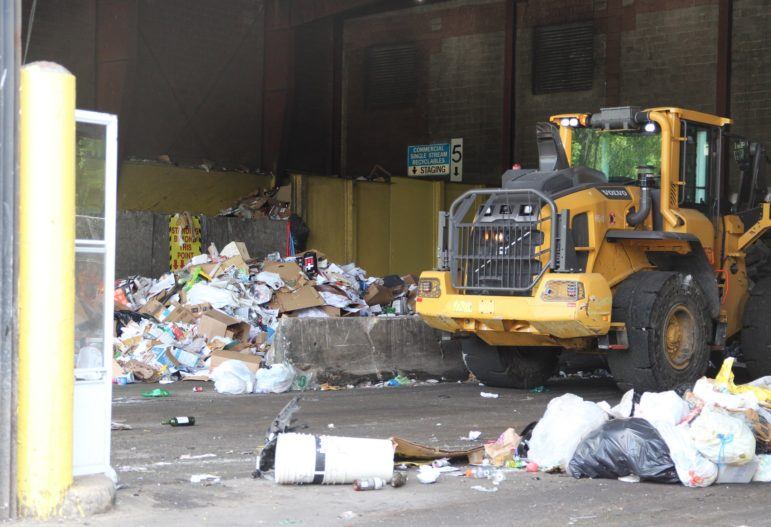Submitted by , Julie DesChamps, Founder, Waste Free Greenwich
The killings of George Floyd and Brianna Taylor and the national protests that followed have brought social injustice front and center again. However, another form of inequality suffered by communities of color is not so obvious but has just as dangerous and fatal consequences – environmental racism.
The Greenwich community has a hand in creating public policy that contributes to this injustice, and it is time that we fight environmental racism by reforming our unsustainable waste management
system.
Communities of color are disproportionately impacted by air pollutants linked to serious health problems from respiratory and cardiac disease to maternal complications and premature death, as evidenced by study after study.
According to a 2018 EPA report, minorities, especially blacks, bear a
far greater burden – up to 54% higher – from particulate matter, like soot and gaseous pollutants, than the overall population. According to the Center for Disease Control and Prevention, asthma rates in black children are double those of white children, and this population is 10 times more likely to die of complications from asthma. Further, research published in JAMA this month highlighted the link between air pollution and preterm birth and low birth weight, particularly among black mothers.
Polluting facilities, like incinerators, have been historically sited in minority communities resulting in detrimental health consequences. A 2019 New School study revealed that 79% of incinerators are located in low-income communities of color.

Burning trash emits toxins, such as mercury, lead, nitrous oxide and particulate matter. The health impacts of air pollution and their costs, including medical treatment, school and work absences and missed opportunities, are staggering. In fact, pollutants from the Baltimore Wheelabrator incinerator account for health costs of $55 million
annually, according to a 2017 Chesapeake Bay Foundation report.
Peekskill, New York – where the bulk of Greenwich’s trash is burned – is a low-income community of color that suffers a disproportionate public health burden. Almost 60% of its population is black or Hispanic, and over 70% of students are eligible for free lunch.
The rate of asthma hospital visits was 107 per 10,000 population, far higher than the average rate of 57 for New York State. Peekskill residents unequally endure the injurious consequences of our unsustainable waste management system and individual habits.
Recently, our town leaders twice failed to act against environmental injustice, by curtailing trash output and reducing the burden on the Peekskill community. First, the Board of Estimate and Taxation (BET) refused to fund a reusable ware system in Greenwich Public Schools (GPS), replacing disposables with durables, an initiative to curtail lunchroom waste by 80%. The most effective and fiscally responsible solution, a system whereby reusable trays and utensils are sanitized at a centralized location, would save an estimated $67k in net annual operating expenses, and savings from the purchase and disposal of single-use products would cover the upfront capital costs.
However, the chance to reduce waste and expenses at GPS, the largest town entity, was lost as part of the $3 million budget cuts. Although BET members Ramer, Kreuzer and Krumeich fought to restore funding, others made the shortsighted decision to oppose the measure. Instead, this coming school year over a million single-use wares will be purchased and trashed at a cost of over $127k to taxpayers, the detriment of our air and soil quality and the health of Peekskill residents.
The affront to environmental justice didn’t stop there.
In May, the RTM chose to institute tipping fees over Pay As You Throw (PAYT), as a result of the increased recycling costs. New England municipalities that adopted PAYT achieved a 40-55% reduction in their waste stream, and Maine communities with PAYT had 65 lbs per capita of waste versus 356 lbs without. While PAYT incentivizes waste reduction by rewarding those who generate the least trash, tipping fees do nothing to encourage diversion.
Further, PAYT is the least expensive option for households, while still filling the budget gap.
Led by RTM committee chairs Jansen, Spilo and Basham, opponents of PAYT ignored these facts, promoted a disinformation campaign to kill the proposal and engaged in legislative manipulation to gag proponents, including experts from CT DEEP.
In all the hours of debate and ink spilled in the local press, not once did PAYT skeptics acknowledge the burden of our waste system on Peekskill’s community, the harmful effects on our environment and public health and the responsibility we bear.
They let another opportunity to fight environmental injustice and implement a long-term solution to our waste crisis slip through their hands.
If our leaders won’t act against environmental racism by adopting measures to reduce waste and ameliorate its detrimental effects, we, as individuals, should and can. We must change consumer habits to stop waste before it starts. Choose reusables over disposables, donate unwanted items to those in need, divert food scraps through composting and recycle right. And most importantly, speak out against environmental policies that foster racial inequality and vote for leaders who will advocate for the health of our planet and all its inhabitants regardless of race.
Julie DesChamps
Founder, Waste Free Greenwich